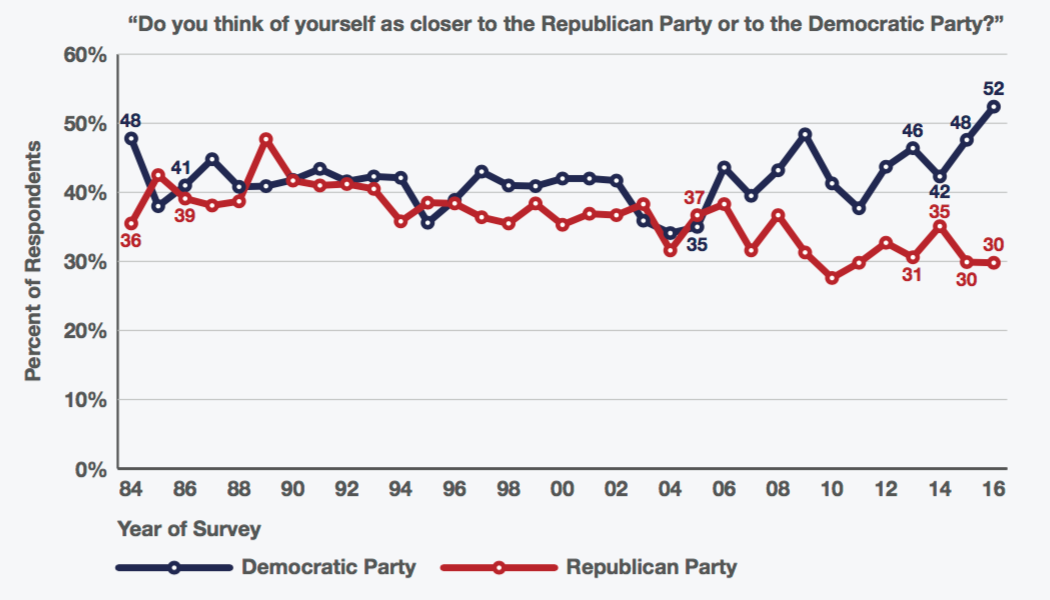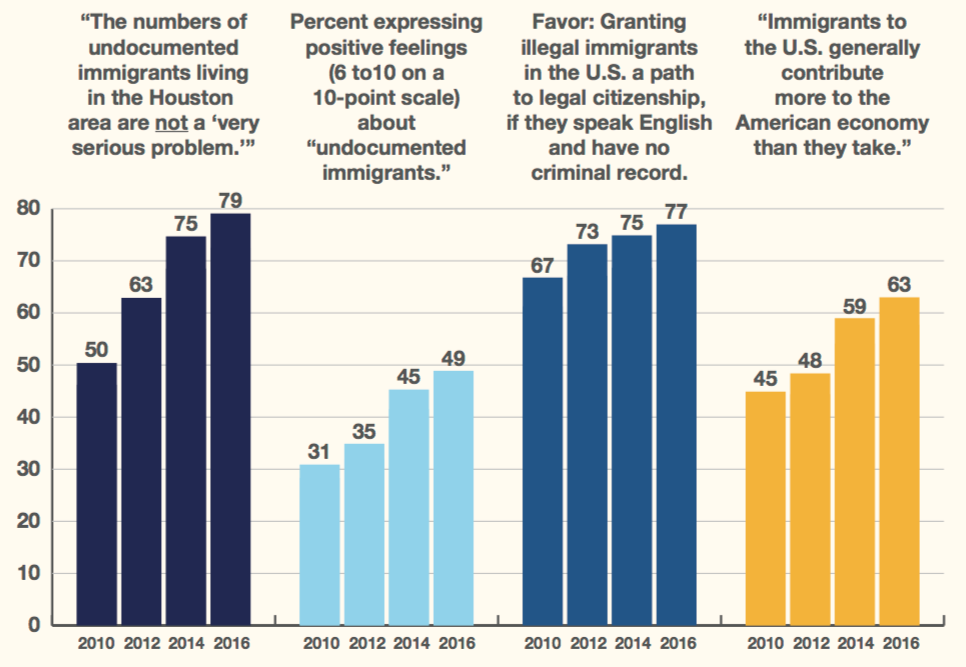Houston, the largest city in Harris County, may be the home of conservative Republican presidential candidate Sen. Ted Cruz. But new survey findings show that, for the first time ever, the majority of Harris County residents now say they align more closely with Democrats than Republicans.
The finding is one of the highlights of the Kinder Houston Area Survey, an annual public opinion poll now in its 35th year.
For a decade, more Harris County residents have said they think of themselves as closer to the Democratic Party than the Republican Party.
But this year, the Democrats have their highest numbers yet. Fifty-two percent of residents identified as closer to the Democrats, compared to 30 percent of residents who feel closer to the Republican Party.
During the 2012 presidential election, Democrat Barack Obama and Republican Mitt Romney roughly split the Harris County vote, with Obama squeezing out 971 more votes. The 2016 Kinder Houston Area Survey included all types of residents — not just likely voters.

The survey also touched upon themes of inequality, one of the biggest topics of the 2016 presidential campaign.
“We see the political success of Bernie Sanders and Donald Trump as a reflection in part of feelings that lower-and middle-class folks are suffering in this economy,” said Stephen Klineberg, who developed the survey and serves as founding director of the Kinder Institute.
Sixty-six percent of area residents said the government should take steps to reduce income differences in the U.S., and 76 percent said the government should ensure that everyone who wants to work can find a job; in both cases these were higher numbers than ever before in the surveys.
The results were closely related to another theme that emerged in the survey: empathy.
Forty-three percent of respondents say most people on welfare are really in need of help. That number has grown significantly in recent years. “There’s an increasing recognition that people can fall into poverty due to circumstances they can’t control, and the government is the only mechanism we have to counteract the growing inequalities developing out of the free enterprise system,” Klineberg said.
Other highlights of this year’s survey:
Optimism
Although oil prices have declined steadily in Houston, the energy capital of the U.S., residents remain upbeat. “The surprise this year is there’s been no lessening of optimism, given the continuing loss of jobs in the oil and gas sector,” Klineberg said. “Residents are as upbeat as they’ve ever been, if not more so.”
Approximately 62 percent of local residents rated Houston job opportunities as “excellent” or “good.” That’s a dip from the 2015 total, when 69 percent of residents had that view. But it’s still the second-highest total since 2002. The optimism comes at a time when there are signs that the local economy has slowed since its more booming period during the shale revolution and is returning to a period of more normal, gradual growth.
And, despite that economic slowdown, Houstonians generally seem content with their city. Eighty-one percent of residents rate Houston as a good or excellent place to live, up from 70 percent a decade ago.
Diversity

There’s also a continued improvement in Houstonians’ acceptance of different types of communities. Area residents' attitudes toward Muslims, illegal immigrants, and gay people continue to improve annually. “In every case,” Klineberg said “the views are more positive than they were before.”
For example, more people than ever – 63 percent – believe immigrants contribute more to the U.S. economy than they take. That’s up from 45 percent in 2010. “We’ve had 30 years of Houston being a city of immigrants,” Klineberg said, "and residents are increasingly aware of how much immigrants have contributed to the vitality of the region."
There’s also a rising number of people who seem unconcerned with undocumented immigration as a problem. Today, 79 percent of Houston area residents say undocumented immigrants living in the area are not a “very serious” problem. That’s up from 50 percent just six years ago.
Equal rights
Interestingly, the survey also sheds light on Houstonians’ attitudes toward the equal rights ordinance. Last year, voters rejected the city’s equal rights ordinance, with 61 percent of voters opposing it.
That’s a stark contrast from the 70 percent of Houstonians in the survey who believe it’s “very important” for Houston to pass an equal rights ordinance that protects people from discrimination. “And yet,” Klineberg said, “we voted against it.”
He speculated the discrepancy is due to who actually showed up at the polls. Those who opposed the ordinance may have been more motivated to vote. Also, he noted, the controversial television ad campaign that played into fears that the law would allow men to prey on women and children in restrooms. “The vote was about a bathroom ordinance, not about equal rights, and it’s a reminder of the importance of the way these propositions get framed in the political process,” Klineberg said.
Criminal justice reform
As the national discussion about criminal justice reform continues, the topic appears to be gaining traction among Houstonians as well. Today, fewer area residents than ever before – just 27 percent – support the death penalty over life imprisonment. This represents a remarkable shift in a place that historically has sent more inmates to death row than any other part of the country (though, notably, those numbers have waned in recent years).
As the survey report notes, “the recent revelations of discriminatory sentencing, innocent persons being freed from Death Row just before their scheduled executions, and botched lethal injections have been eroding support for capital punishment, and the costs of seeking the death penalty rather than life imprisonment have risen dramatically.”
Meanwhile, 64 percent of the survey participants say it’s a good idea to move away from mandatory minimum sentences for nonviolent drug offenders. In 2011, just 43 percent of the respondents favored a shift away from mandatory minimums.
Housing and transit
Houston is becoming more urban, and that shift is reflected in the changing preferences of Houstonians about their housing. Fully half of all Harris County residents say they’d prefer to live in a smaller, more urbanized home within walking distance of shops and workplaces rather than a single-family home with a big yard where they would need to drive almost everywhere they want to go. That 50-50 split has remained relatively consistent in recent years.
Meanwhile, 62 percent of Harris County residents also say it’s “very important” for Houston to develop a much-improved mass transit system.
“Harris County residents are generally more likely than those in the surrounding counties to call for more urban opportunities,” according to the survey report, “but the findings also indicate strong support for walkable alternatives even in the two far more sprawling, car-oriented counties.”
Religion
Lastly, 18 percent of Houstonians said they had “no religious preference" in 2016. That’s up from just 6 percent back in 1982, when the survey was launched. Meanwhile, today, 55 percent of area residents said they hadn’t attended a religious ceremony (aside from a wedding or funeral) in the last month.
It was the first time more than half responded that way. Back in 2009, only a third of area residents had gone a month without attending a religious ceremony.
And yet, even though they aren’t going as much to church, mosque, or synagogue, 59 percent say religion is “very important” in their lives.
“The rise of the 'nones' does not mean that religious or spiritual sensitivities are disappearing from the Houston scene,” according to the survey report.

